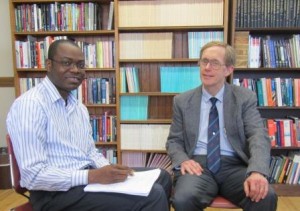
Clark University economics researcher and Ph.D. student Gbetonmasse B. Somasse has been selected by the International Economic Association to present a recent paper at the Young African Scholars Program.
Somasse’s research is built on his insights about the problems faced by African countries during the development process – especially the role played by education. He will present his paper, “Distribution of Educational Outcomes and Inequality Analysis in Benin after the 2006 Free Tuition Policy,” when he attends the IEA World Congress in Amman, Jordan, June 6-10.
“My previous work experience at the U.N. Economic Commission for Africa and the U.N. Development Program sparked my interest in poverty and inequality analysis in Africa,” Somasse said. “I am fascinated by the importance of education, not only on its own right, but also in reducing various dimensions of inequality.
“My research focuses on how economic theory and empirical analysis provide insights to improve development strategies in developing countries. My ongoing research investigates the effect of education policies and their implications in terms of inequality in Benin. I have also conducted research into estimating return to education and understanding how teacher incentive might influence student’s performance.”
The IEA Young African Scholars Program provides “a forum for discussing innovative theoretical and empirical research on the key challenges facing Africa, and to facilitate the exchange of views among researchers and policymakers as the continent search its path towards economic emergence.”
According to the program, accepted papers shed light on how such economic challenges operate in practice, and how they interact with each other, especially in terms of their effect on growth, macroeconomic stability and resilience to shocks, and employment creation.
In 2014, Somasse presented a paper, “Effects of Free Primary Education on Educational Outcomes in Benin,” at the Eastern Economic Association.
Somasse received a B.A. in Statistics at the University of Abomey-Calavi, Republic of Benin, and an MSc, Economic Statistics/ ENSEA, Abidjan, Cote d’Ivoire.
To learn more about Economics at Clark, visit http://www2.clarku.edu/departments/economics/.
Founded in 1887 in Worcester, Massachusetts, Clark University is a liberal arts-based research university addressing social and human imperatives on a global scale. Nationally renowned as a college that changes lives, Clark is emerging as a transformative force in higher education today. LEEP (Liberal Education and Effective Practice) is Clark’s pioneering model of education that combines a robust liberal arts curriculum with life-changing world and workplace experiences. Clark’s faculty and students work across boundaries to develop solutions to complex challenges in the natural sciences, psychology, geography, management, urban education, Holocaust and genocide studies, environmental studies, and international development and social change. The Clark educational experience embodies the University’s motto: Challenge convention. Change our world. www.clarku.edu


